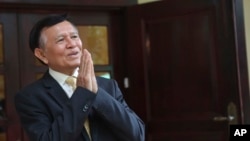The morning session of opposition leader Kem Sokha’s treason trial centered around a video clip that shows him talking about assistance he got from the United States to plan his political career, with the defense asking the court to play the entire video rather than just a two-minute edited clip.
The highly-anticipated trial commenced this morning at the Phnom Penh Municipal Court and is expected to last at least three months. There were 12 witnesses present in the court, with 15 absentees.
However, a bulk of the morning session saw the prosecution, defense and government lawyers debating whether the entire video clip of Kem Sokha needed to be played in court.
After the two-minute edited clip was played in court, Kem Sokha, responding to queries from the panel of three judges, said that the video did not belong to him, but that he was the person who was speaking in the clip.
However, he took umbrage with the edited clip and removed a USB drive asking for the court to play the entire video recording, which would show that the shortened clip was misleading. He also wanted the court to investigate where the two-minute clip originated from and who edited it.
“That video is very important. If you don’t play it then this trial cannot be a just trial,” Kem Sokha said in court.
The video has been the only evidence presented publicly by the government to support the treason charges against Kem Sokha. The video was released shortly after Kem Sokha’s midnight arrest in September 2017 by the government’s Press Quick Reaction Unit.
Prosecutors and government lawyers, lead by Ky Tech, attempted to challenge Kem Sokha’s request. Ky Tech warned the court that using Kem Sokha’s USB drive could result in the court clerk’s laptop exploding or it could destroy all the files on the computer.
The panel deliberated on the issue for around 45 minutes and made a vague announcement that they “accept the video,” however, the court still wants Kem Sokha’s legal team to submit documents related to the video before January 20.
The video in question is from 13-minute long clip of Kem Sokha at an event in Australia in 2013. The spliced video, which uses different segments of the entire clip, has Kem Sokha saying that he had visited the U.S. on multiple occasions to learn about the democratic process and that it was recommended that he step aside from politics to be able to create real change – after which he started a human rights organization in Cambodia.
He goes on to add, in the video, that the U.S. suggested that he look at the Yugoslavia model and the removal of Slobodan Milosevic, referring to the former Serbian and Yugoslavian leader who resigned amid popular protests following disputed elections.
“The true intention of what I said publicly on November 9, 2013, is to thank and inform about the political situation in Cambodia. And my intention is not to set up a plan to topple the government,” Kem Sokha informed the court on Wednesday.
Government lawyer Ky Tech also asked the court use Khmer letters as monikers for countries that were involved in the case, so as to not affect diplomatic relations with those nations.
The government has consistently harped on the United States for aiding in the so-called color revolution. Ruling party and government officials have invoked the U.S. to warn of a potential revolution in the country, however, with little evidence provided to support the claim.
The U.S. and Cambodia have seen small improvements in their relationship in the last few months, following the arrival of seasoned U.S. diplomat and new ambassador, W Patrick Murphy.
Speaking to the media after the morning hearing, Ky Tech further elaborated that nine countries were involved in the case: Indonesia, Yugoslavia, Serbia, Australia, U.S., Canada , The EU, Taiwan and India.
He added that there were other international organizations and foreign nationals who were also linked to the case, but did not name them.
As the trial proceeded, an increasing number of opposition supporters, civil society groups and journalists congregated outside the court, watched by at least 200 mixed security forces.
Speaking outside the court, Prince Sisowath Thomico, a former member of the Cambodia National Rescue Party, said that a few members of the party senior leadership had asked to accompany Kem Sokha for the hearing but their request was rejected.
He said they were prevented from entering the court because they had been banned from politics, referring to the 2017 Supreme Court decision on the dissolution of the CNRP, that banned 118 of its senior leaders from politics.
“If Kem Sokha is accused of betraying the country then every member of the CNRP, especially the leadership of the CNRP, should have been accused the same,” he said. “Because we are part of the same group, the same movement.”







